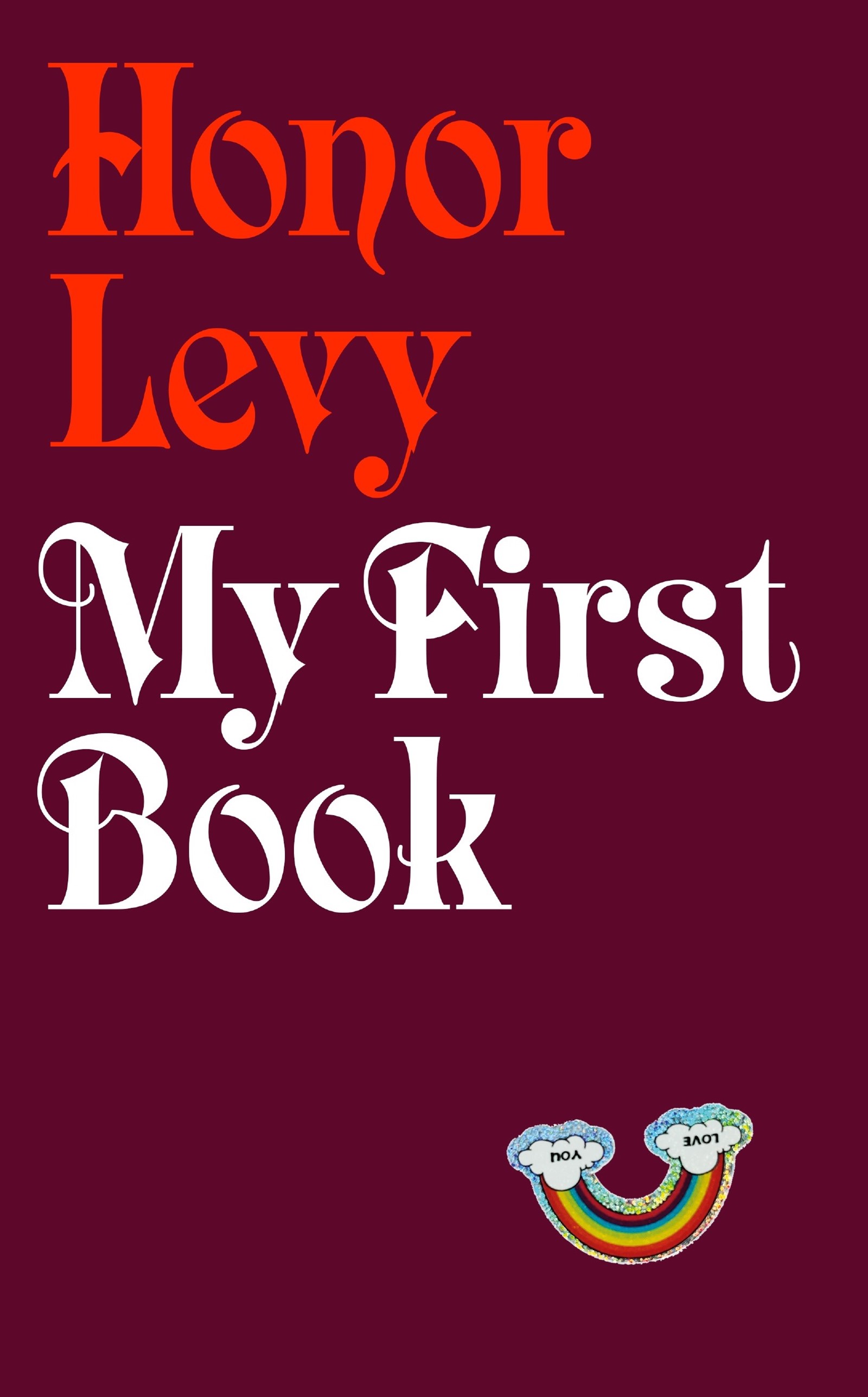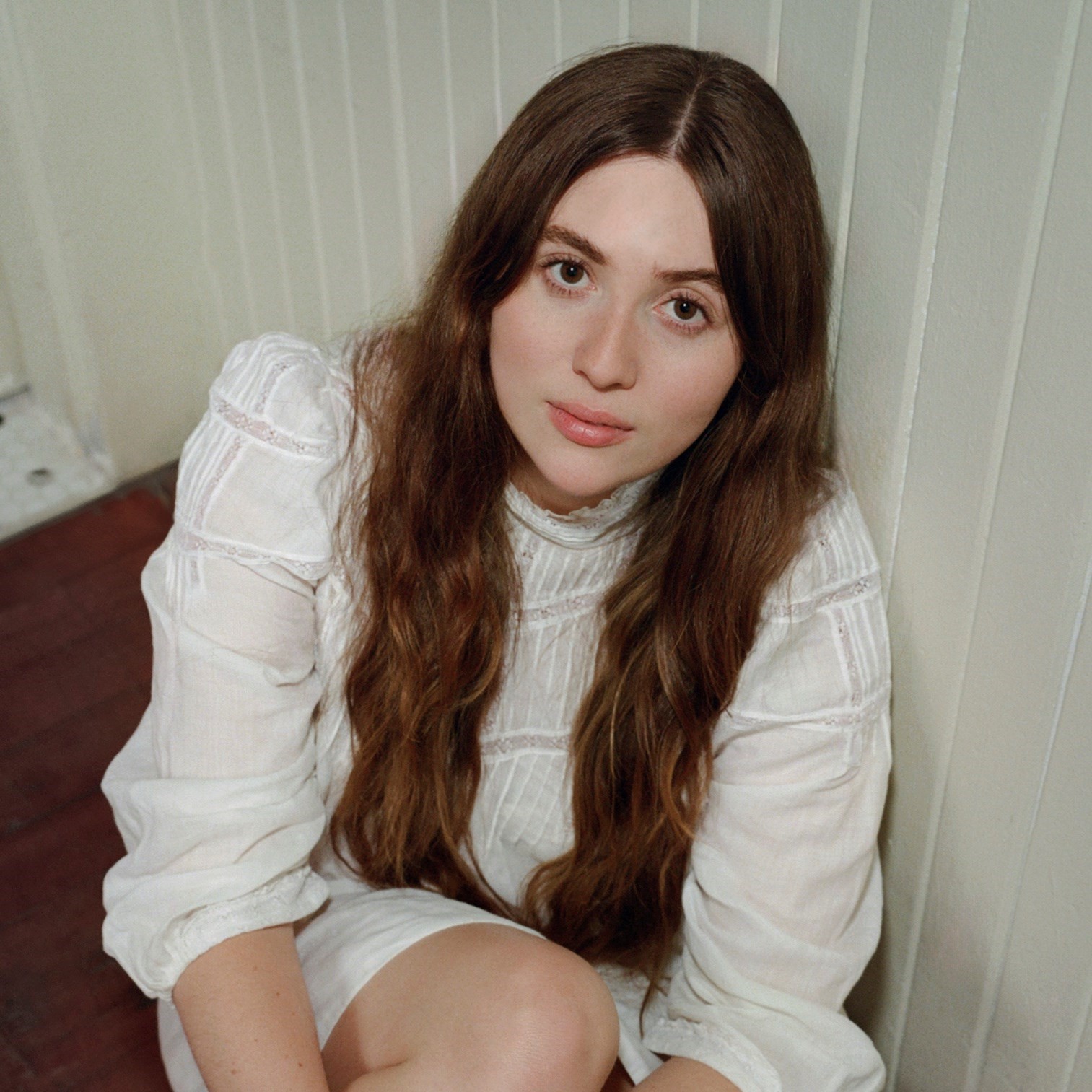With her debut story collection, My First Book, California-born author Honor Levy wants to entertain. “I love telling a story and having fun,” says the 26-year-old, appearing as a disembodied voice on a Zoom call. A grey glow emanates from a dark square that reads: Honor Levy’s iPhone (2). “I just hope [people] don’t get bored reading the writing in this book. Especially if you get bored easily, I hope you can read one of these stories without getting bored.”
Levy’s flash fiction tales are manic and essayistic, employing a fragmentary mode (like in those wan little husks of contemporary lit fic) and an Urban Dictionary-esque vernacular to explore topics across gender, cringe, politics; plus the existential chaos consequent of these things combined with our ever-looming, anthroposcenic reality. Her reference points span Wellbutrin to Wojaks to “hikikomori femcel[s]” and Bakugan Battle Brawlers. She places Bella and Edward in a lineage of literary lovers with Adam and Eve, Orpheus and Eurydice. If it’s not abundantly clear by this point, My First Book is foremostly for the shitposters. She’s playing this thing by meme rules – which is to say, lawlessly.
The results are not always successful, but when they are, the text is provocative and poetic in its stylistic repetition, oftentimes humorous and enjoyably surreal. “I dream that I’ve given birth to a litter of kittens. I’m at the hospital and they come out of me and everyone tells me that I did a good job,” she writes in Hall of Mirrors, one of a few stories told from a child’s perspective. Levy’s narrators are intrepid and neurotic, creative and transgressive and insatiably curious, in absolute control of their agency and girlhood while simultaneously spiralling out of it.
Below, AnOther spoke with Honor Levy about the ideas behind My First Book.

Jenna Mahale: Reading your book, one of the things that really leapt out at me was its formal flourishes: the way some stories have a URL and password for online access, or the ASCII illustrations for each story. Can you unpack what went behind those decisions?
Honor Levy: So when Internet Girl was originally published with Tyrant Books, it had a bunch of fun links embedded in it. We didn’t end up keeping the things that were links underlined when they were printed, so I just ended up putting all of the words that were originally links on a website that you can click and visit. And then we did the same for Love Story, because it seemed weird to only do that for one story in the book. But I don’t think you should use the websites as you read along or anything, they’re just a fun little interactive resource.
JM: And the illustrations, did you draw those yourself?
HL: A lot of them, but also a lot of them are just old ASCII that I edited myself. The little ASCII faces, like the cow emojis – I did those. And other ones were just random ones that existed and were open source, because it’s basically just a smiley face.
JM: My First Book references legendary writers like Simone Weil and Hélène Cixous, but I want to know what more recent, perhaps online-lit influences have informed this work?
HL: I’ve read some good nonfiction about the internet, like Julian Dibbell’s My Tiny Life. Or there’s Erik Davis with his book Techgnosis. I don’t know much about the internet novel or whatever. There’s that Patricia Lockwood one that I’m sure is really good – I like her poems. But I don’t know, I just like reading stuff on the internet. You can find support groups and forums for any issue; for people who think they’re reincarnated witches from Salem. Or there are creepypastas and people making up new myths together.
JM: There’s a throughline in the book with regards to corporeal obsessions and eating disorders – is this a feminist track, an expression of the online milieu, or something more?
HL: It’s just interesting to me as a fucked-up subculture, I guess. There’s this online community that has been around since the early internet, across forums and stuff, that’s so devoted to their cause. That a whole culture can grow around a sickness is very interesting to me; there’s all this eating disorder ephemera and memes. They have all their own lingo and ideas and images and devils and saints and stuff, you know? Really, the culture is kind of stuck – it’s using the same thinspo that, when I was a teenager, I would see. And to this day it’s still appearing on my feed. It's like, come on, grow up. Get some new ideas!
“Alcohol? That stuff is OK. Take it or leave it. And coke? It’s not as good as Adderall” – Honor Levy
JM: I feel like there are shades of your elite education in these references to ancient history, classic mythology and cross-continental field trips. Bennington College is this institution with so much mystique and lore around it, but what was it really like to go there? Were there any crazy scandals?
HL: I mean, it was really great. It was amazing being in such beautiful nature all the time, and the classes were great and so small. Everyone knew everyone but also they didn’t. It was just an amazing place, I highly recommend it. As for scandals, there definitely were some: someone lit a building on fire, and there were some terrible deaths. And then there were dramas of people sleeping with people … I don’t even know. I’m sure every single class had something crazy happen because it’s a place that demands narrative and story. I guess things are always happening because it’s in the middle of nowhere and so small.
JM: Have you seen those ‘what these drugs taught me’ memes? I was hoping we could do one for each of the different drugs that appear in your book.
HL: Ooh OK, let’s make one. So Adderall is like, wow everything is connected, and I can write about it! But also why are there so many shadows in the corner? Weed … something about me don’t sit right with it. That’s what they say right? About people who can’t smoke weed, it means that something is wrong with your soul or whatever. I just get so anxious. It makes me have so many ideas, but it also makes me so stupid I can’t articulate them or write them down. You have to be OK with all these ideas washing over you and not being able to capture them.
JM: Fruit-flavoured nicotine? Alcohol? Coke?
HL: So vaping is like, ‘Wow. I’m so happy I live in the 21st century, but there’s no way this is good for me’. Alcohol? That stuff is OK. Take it or leave it. And coke? It’s not as good as Adderall.
“If saying things like ‘I am a sometimes able-bodied cis white woman’ makes people feel better about themselves, then there’s really nothing wrong with it” – Honor Levy
JM: Between ‘melting ice caps’, ‘mass extinction’ and ‘the climate changing everything’ there’s a lot of environmental doom running through My First Book. What helps you stay hopeful in the face of this?
HL: Science and industry, advancement? I don’t know, there’s a give and take to everything. Like fracking is obviously bad for the environment, but now [America is] not going to have to be in the Middle East as much – not that we ever had to. I think there’s a lot of doom in the book. But I feel like it doesn’t permeate my real life, maybe because I got it all out in writing.
JM: I enjoyed your treatment of online therapy apps as a ‘warning sign’ of, presumably, societal collapse. I feel like I see so many faux-concerned influencers promoting what is really just a sham of a psychological service, collecting their cheques with little regard for the harm they may be perpetuating.
HL: Someone was telling me that they got a BetterHelp therapist and it was just some woman. You could hear her kids screaming in the background. And she’s like, ‘Oh, that really sucks. I’m sorry you’re going through that’. It’s like Uber drivers but for therapy. Lots of people can drive, but not everyone can do that.
JM: You express misgivings with identity politics at multiple points throughout the book. In ‘written by a sad girl in the third person’, the narrator says she thinks they are ‘mostly a bad idea’ and that ‘she can explain her stance some other time’. Can we talk about it now? What makes them bad?
HL: Well, I have no idea. It’s just something these narrators in the story thought. But there is this atomisation in identifying as different things and separating everyone. If saying things like ‘I am a sometimes able-bodied cis white woman’ makes people feel better about themselves, then there’s really nothing wrong with it. At the time when I was writing it, I just thought identity politics were fun and funny. Even when I have misgivings about things, I often just think they’re fun and funny deep down. I’m not here to be a cultural critic or tell people how they should think or be.
My First Book by Honor Levy is published by Granta, and is out now.
